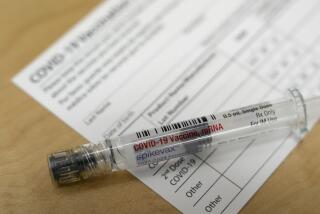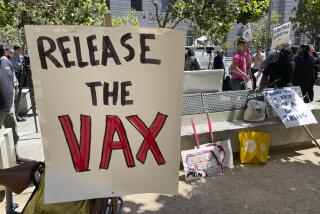Fearing Bioterrorism, U.S. Orders Early Delivery of Vaccine
- Share via
WASHINGTON — A federal health agency said Monday that it had arranged for the maker of a smallpox vaccine to deliver millions of doses next year--two to three years ahead of schedule--as a hedge against one of the most feared forms of potential biological attack.
The action by the Department of Health and Human Services came as rising fears of bioterrorism are throwing a renewed focus on vaccines as a method to protect citizens and troops.
The Biotechnology Industry Assn. last week issued an “urgent” inquiry to more than 1,000 companies asking, among other things, for their ideas on ways to draw more companies into the vaccine business. And Defense Department officials are sorting through how to boost their program to vaccinate the armed forces against anthrax.
Terrorism experts say it is unlikely that the United States would face a biological attack. But more than a dozen nations and terrorist groups are believed to have tried to develop biological weapons, with varying degrees of effort and success. Anthrax is considered one of the most likely lethal agents to be turned into a weapon, and smallpox, although less likely, is feared because it is highly contagious.
The federal government last year contracted with Acambis PLC, a British company with operations in Cambridge, Mass., to produce 40 million doses of a new type of smallpox vaccine. On Monday, however, the Department of Health and Human Services said it had arranged for Acambis to deliver all 40 million doses by mid- to late 2002, well ahead of the previous delivery date of 2004 or 2005.
Department spokesman Kevin Keane said federal regulators had met with Acambis to set a faster timetable for production and approval of the vaccine. Keane said that the meetings had been instigated by Health and Human Services Secretary Tommy G. Thompson, and that they included the Food and Drug Administration and the National Institutes of Health.
News of the accelerated delivery was first reported Monday by the Wall Street Journal.
Federal officials have about 15 million doses of an older smallpox vaccine on hand. The government will stockpile both the old and new vaccines for use in an emergency, Keane said, and will not make them available to doctors for general preventive use by nervous citizens.
Similarly, there are no plans to make an anthrax vaccine available to the public.
The anthrax regimen includes a series of vaccinations over 18 months, followed by annual boosters, according to the federal Centers for Disease Control and Prevention. Experts say that the immunity conferred by the smallpox vaccine has probably diminished in all who received the shot, which was last administered in the United States 25 years ago.
Since the Sept. 11 attacks, more than 1,000 people have contacted the sole maker of a government-approved anthrax vaccine to ask about its availability. The company, BioPort Corp. of Lansing, Mich., has received so many calls that it is guiding people to a recorded message.
The company is making the vaccine only for the Department of Defense. BioPort spokeswoman Kim Brennan Root said the company has held some internal discussions about how to make the vaccine available to the general public. But she could provide no timetable for when people might be able to obtain the vaccine.
In case of an anthrax outbreak, health officials would draw on a government antibiotics stockpile to treat citizens.
The Defense Department originally wanted to vaccinate all 2.4 million active and reserve troops against anthrax, but it has scaled back its plans due to a vaccine shortage.
Industry officials say that vaccine production is a tricky business proposition, because investors are less willing to put up money for vaccines than for other drugs.
Demand for many types of vaccine is uncertain, and companies fear being sued by adult consumers who claim side effects, said Carl Feldbaum, president of the Biotechnology Industry Assn. A special fund created by Congress gives the industry certain protections from liability claims related to mandated childhood vaccines.
More to Read
Sign up for Essential California
The most important California stories and recommendations in your inbox every morning.
You may occasionally receive promotional content from the Los Angeles Times.










